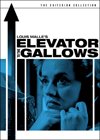
THE COMPLETE MR. ARKADIN
 In April we offer one of our most exciting titles yet: Orson Welles’s The Complete “Mr. Arkadin.” While film scholars agree that there is no definitive version of this wonderfully garish, labyrinthine, European-travelogue mystery, we’ve pulled together all the enticing evidence. Our three-disc set features the Corinth version (the earliest extant English-language print and what many believe to be the closest to Welles’s vision of the film); Confidential Report, the 1956 European release; and our brand-new “comprehensive version,” an amalgamation of elements from all known versions, pieced together like a jigsaw. Also included is the equally mysterious novel of the film, a pulp classic in the tradition of James M. Cain, and three half-hour episodes of the radio program The Lives of Harry Lime, upon which the film is based.
In April we offer one of our most exciting titles yet: Orson Welles’s The Complete “Mr. Arkadin.” While film scholars agree that there is no definitive version of this wonderfully garish, labyrinthine, European-travelogue mystery, we’ve pulled together all the enticing evidence. Our three-disc set features the Corinth version (the earliest extant English-language print and what many believe to be the closest to Welles’s vision of the film); Confidential Report, the 1956 European release; and our brand-new “comprehensive version,” an amalgamation of elements from all known versions, pieced together like a jigsaw. Also included is the equally mysterious novel of the film, a pulp classic in the tradition of James M. Cain, and three half-hour episodes of the radio program The Lives of Harry Lime, upon which the film is based.Needless to say, we are thrilled to present this truly comprehensive set, which reflects the contributions of Orson Welles scholars from around the world who have been trying to untangle this enigma for decades. Premiere magazine, which picked The Complete “Mr. Arkadin” as its May classic DVD of the month, said: “Amazing . . . It’s difficult to imagine a better or more important DVD set coming out this year.”
ELEVATOR TO THE GALLOWS
 We’d always wanted to get Jeanne Moreau on camera for an interview but were never able to convince her, not even for Jules and Jim. But when it came to Louis Malle’s feature-film debut, Elevator to the Gallows, the grande dame of French cinema was all ready to sit with us for a nice, long chat. Perhaps it’s because the film, and Malle himself, remain so important to her to this day: speaking of her director, and onetime lover, Moreau states, “He opened doors for me, as though I came out of a jail.”
We’d always wanted to get Jeanne Moreau on camera for an interview but were never able to convince her, not even for Jules and Jim. But when it came to Louis Malle’s feature-film debut, Elevator to the Gallows, the grande dame of French cinema was all ready to sit with us for a nice, long chat. Perhaps it’s because the film, and Malle himself, remain so important to her to this day: speaking of her director, and onetime lover, Moreau states, “He opened doors for me, as though I came out of a jail.”We’ve also always been crazy about Miles Davis’s incredible soundtrack for Elevator to the Gallows, but what came as a real surprise was discovering just how much his score changed jazz history. Music critic Gary Giddins states in Miles Goes Modal, a special documentary feature on our release, “Where Miles Davis went, jazz went.” Well, on December 4, 1957, where Miles Davis went was the cinema, right on the cusp of the French new wave. Davis, after a little convincing from Malle, recorded the haunting, improvised score in one all-night session in Paris, with a host of young musicians. Davis’s score, Giddins says, showed “the beginnings of what would develop into his Milestones and Kind of Blue.” In this video clip sample, Giddins and jazz trumpeter John Faddis discuss Davis’s unforgettable contribution to film history.
FISTS IN THE POCKET
 With both Marco Bellocchio and Bernardo Bertolucci having just burst onto the film scene, Italian cinema was seemingly at its radical peak in the mid-sixties. Bellocchio’s blackly comic Fists in the Pocket, with its depiction of a violently dysfunctional middle-class family that descends into murder, so infuriated Italy’s Christian Democrat Party that forty-one of its members called for its ban. Seen as a grotesque attack on “decent” family values, Bellocchio’s deliciously morbid cause célèbre really shook up the right-wingers, but its full-frontal assault on the bourgeoisie piqued the interest of critics, festival juries, and cinephiles everywhere, and it’s remembered to this day as a landmark.
With both Marco Bellocchio and Bernardo Bertolucci having just burst onto the film scene, Italian cinema was seemingly at its radical peak in the mid-sixties. Bellocchio’s blackly comic Fists in the Pocket, with its depiction of a violently dysfunctional middle-class family that descends into murder, so infuriated Italy’s Christian Democrat Party that forty-one of its members called for its ban. Seen as a grotesque attack on “decent” family values, Bellocchio’s deliciously morbid cause célèbre really shook up the right-wingers, but its full-frontal assault on the bourgeoisie piqued the interest of critics, festival juries, and cinephiles everywhere, and it’s remembered to this day as a landmark.


No comments:
Post a Comment